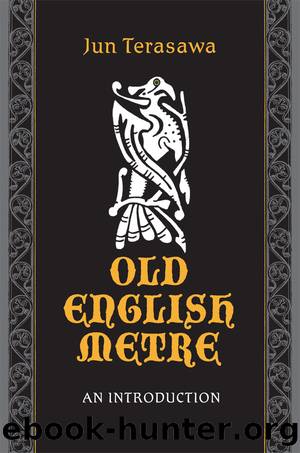Old English Metre by Terasawa Jun;

Author:Terasawa, Jun;
Language: eng
Format: epub
Tags: LIT011000, LAN023000
Publisher: University of Toronto Press
Published: 2011-05-29T16:00:00+00:00
[Though you gave one name to all the creatures, naming all together and calling (them) the world]
[however, (you) named all together by one name, the world under clouds]
Replacement of the inflectional form by a mid-phrase is attributable to metrical requirements: the Meters poet adds the preposition mid to fill out the minimum four metrical positions. Without mid, the half-line would result in too short a verse with three metrical positions with noman resolved.
Not only does metre affect the choice between inflectional forms and prepositional phrases, but it can also determine the case which a preposition will take. In Old English, some prepositions govern more than one case, most frequently the accusative and dative. The choice between cases is often made on semantic grounds: the accusative denotes âmotionâ (e.g., oþ ðæt Åþer cÅm / gÄar in geardas âuntil another year came to the dwellingsâ Beo 1133bâ4a) while the dative denotes âlocationâ (e.g., ÃÇ£m eafera wæs / æfter cenned / geong in geardum âTo him a young son was later born in the dwellingsâ Beo 12â13a) although the distinction is often blurred. Consider this passage from the Seafarer:
Download
This site does not store any files on its server. We only index and link to content provided by other sites. Please contact the content providers to delete copyright contents if any and email us, we'll remove relevant links or contents immediately.
The Universe of Us by Lang Leav(14358)
The Sun and Her Flowers by Rupi Kaur(13681)
Adultolescence by Gabbie Hanna(8137)
Whiskey Words & a Shovel II by r.h. Sin(7475)
Love Her Wild by Atticus(7224)
Smoke & Mirrors by Michael Faudet(5506)
Wiseguy by Nicholas Pileggi(4581)
The Princess Saves Herself in This One by Amanda Lovelace(4503)
Love & Misadventure by Lang Leav(4351)
Milk and Honey by Rupi Kaur(4223)
Memories by Lang Leav(4166)
Good morning to Goodnight by Eleni Kaur(3802)
Bluets by Maggie Nelson(3705)
Too Much and Not the Mood by Durga Chew-Bose(3689)
Algedonic by r.h. Sin(3494)
Pillow Thoughts by Courtney Peppernell(3382)
The Poetry of Pablo Neruda by Pablo Neruda(3358)
HER II by Pierre Alex Jeanty(3165)
Stuff I've Been Feeling Lately by Alicia Cook(3051)
